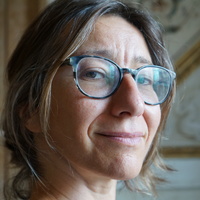I am a STARS @ UNIPD research fellow, exploring the implementation and impact of AI technologies in news industries in Italy and Finland. My research interests lie in intercultural dialogue(s) and knowledges; (visual) ethnographic and participatory research in contexts of urban/ digital violence; the relationships between conventional and new media; AI governance, media policy and gender equality.
Supervisors: Prof Claudia Padovani
Supervisors: Prof Claudia Padovani
less
Related Authors
Vian Bakir
Bangor University
Anna Verbytska
Martin-Luther-Universität Halle-Wittenberg
Pedro Rodrigues Costa
Universidade Lusófona do Porto
Andrew McStay
Bangor University
Hassan Zaheer
University of Karachi
Míchílín Ní Threasaigh
University of Toronto
Joshua Tucker
New York University
Niko Pyrhönen
University of Helsinki
InterestsView All (7)









Uploads
Papers by Alice Baroni
This study takes an ethnographic and discursive approach to investigating and comparing two categories of professional photographers to determine how their working practices contribute to empowering the people living in Brazil's favelas. While mainstream photojournalists mainly cover human rights abuses in the favelas, community photographers challenge stereotypes by presenting images of the favelas' everyday life.
Despite increasing death among journalists working in the favelas, mainstream photojournalists value the power of images of armed confrontations and social struggles in encouraging public discussion and advocating for actions to end human right abuses. On the other hand, community photographers, who live in the favelas and face daily threats from rival armed groups, turn to image-making practices as a way of claiming their fundamental right to communicate, so they can actively shape the popular representations of their communities and speak against injustice. I argue that the production of contested visual representations of Rio’s favelas from these sources is a significant contribution to the favela residents’ struggles for human rights.
Much academic analysis has focused on the quality of women’s representation in the Brazilian news media, but there is a dearth of knowledge on the role played by research in women’s rights. This study addresses this gap and poses an important question: how might (visual) ethnographic action research contribute to women’s claims of rights in contemporary Brazil? Here I employ an autoethnographic approach to explore my own activities with female photographers in order for them to create the Brazilian (female) photographers movement. In addition, the negotiation process between ‘them’, photographers, and ‘me’, a female media research scholar, to design and develop the research project is also investigated. As this study is still ongoing, here I present an initial attempt at a reflection on the contribution of this participatory research to FB’s work.